
Rosslare Europort is a modern seaport located at Rosslare Harbour in County Wexford, Ireland, near the southeasternmost point of the island of Ireland. The port is the premier Irish port serving the European Continent with 36 direct services to the Continent weekly. It handles passenger and freight ferries to and from Cherbourg, Dunkirk and St Malo/Roscoff, in France, Bilbao in Spain and Fishguard and Pembroke Dock in the United Kingdom. Since July 2022, a new freight route between Rosslare and Zeebrugge, Belgium was introduced by Finnlines for a twice weekly ro-ro service between the two ports.

Summer time in Europe is the variation of standard clock time that is applied in most European countries in the period between spring and autumn, during which clocks are advanced by one hour from the time observed in the rest of the year, with a view to making the most efficient use of seasonal daylight. It corresponds to the notion and practice of daylight saving time (DST) to be found in many other parts of the world.
An autonomous administrative division is a subnational administrative division or internal territory of a sovereign state that has a degree of autonomy—self-governance—under the national government. Autonomous areas are distinct from the constituent units of a federation in that they possess unique powers for their given circumstances. Typically, it is either geographically distinct from the rest of the state or populated by a national minority. Decentralization of self-governing powers and functions to such divisions is a way for a national government to try to increase democratic participation or administrative efficiency or to defuse internal conflicts. States that include autonomous areas may be federacies, federations, or confederations. Autonomous areas can be divided into territorial autonomies, subregional territorial autonomies, and local autonomies.

Cuilcagh is a mountain on the border between County Fermanagh and County Cavan. With a height of 665 metres (2,182 ft) it is the highest point in both counties. It is also the 170th highest peak on the island of Ireland, and Ireland's only cross-border county top. Water from the southern slope flows underground until it emerges some miles away in the Shannon Pot, the traditional source of the River Shannon. The area is sometimes referred to as the Cuilcagh Mountains.
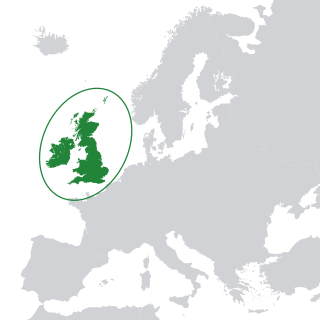
The terminology of the British Isles refers to the words and phrases that are used to describe the geographical and political areas of the islands of Great Britain, Ireland and the smaller islands which surround them. The terms are often a source of confusion, partly owing to the similarity between some of the actual words used but also because they are often used loosely. Many of the words carry geographical and political connotations which are affected by the history of the islands.
This is a list of the maximum potential tax rates around Europe for certain income brackets. It is focused on three types of taxes: corporate, individual, and value added taxes (VAT). It is not intended to represent the true tax burden to either the corporation or the individual in the listed country.

Financial crime is crime committed against property, involving the unlawful conversion of the ownership of property to one's own personal use and benefit. Financial crimes may involve fraud ; theft; scams or confidence tricks; tax evasion; bribery; sedition; embezzlement; identity theft; money laundering; and forgery and counterfeiting, including the production of counterfeit money and consumer goods.

The dwarf bittern is a species of heron in the family Ardeidae.

The United Kingdom of Great Britain and Northern Ireland (UK), since 1922, comprises four constituent countries: England, Scotland, and Wales, as well as Northern Ireland. The UK Prime Minister's website has used the phrase "countries within a country" to describe the United Kingdom. Some statistical summaries, such as those for the twelve NUTS 1 regions of the United Kingdom, refer to Northern Ireland, Scotland, and Wales as "regions". With regard to Northern Ireland, Scotland and Wales particularly, the descriptive name one uses "can be controversial, with the choice often revealing one's political preferences".
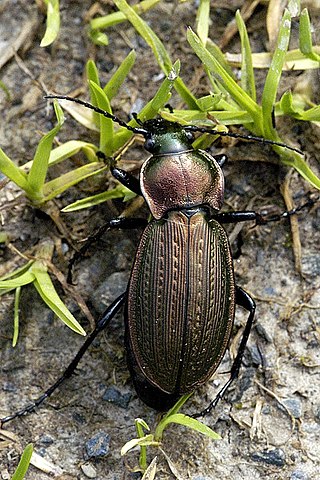
Carabus monilis, the necklace ground beetle, is a species of beetle endemic to Europe, where it is observed in Austria, Belgium, mainland France, Germany, Great Britain including the Isle of Man, the Republic of Ireland, mainland Italy, Liechtenstein, Luxembourg, mainland Norway, mainland Spain, Switzerland, and the Netherlands.

Poecilus versicolor is a species of ground beetle native to the Palearctic. In Europe, it is found in Albania, Austria, Belarus, Belgium, Bosnia and Herzegovina, Bulgaria, Corsica, Croatia, the Czech Republic, mainland Denmark, Estonia, Finland, mainland France, Germany, Great Britain including the Isle of Man, Hungary, the Republic of Ireland, mainland Italy, Kaliningrad, Latvia, Liechtenstein, Lithuania, Luxembourg, Moldova, Northern Ireland, North Macedonia, mainland Norway, Poland, mainland Portugal, Romania, Russia, Slovakia, Slovenia, mainland Spain, Sweden, Switzerland, the Netherlands, Ukraine and Yugoslavia.
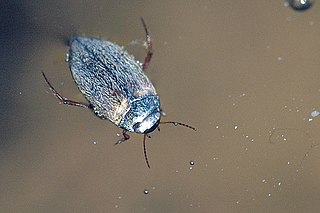
Hydroporus pubescens is a species of water beetle native to the Palearctic and the Near East. In Europe, it is only found in Albania, Austria, the Balearic Islands, Belgium, Bosnia and Herzegovina, Bulgaria, the Channel Islands, Corsica, Crete, Croatia, Cyprus, the Czech Republic, mainland Denmark, the Dodecanese, Estonia, European Turkey, the Faroe Islands, Finland, mainland France, Germany, Great Britain including the Isle of Man, mainland Greece, the Republic of Ireland, mainland Italy, Kaliningrad, Latvia, Luxembourg, Northern Ireland, North Macedonia, mainland Norway, Poland, mainland Portugal, Russia, Sardinia, Sicily, Slovakia, Slovenia, mainland Spain, Sweden, Switzerland, the Netherlands, Ukraine and Yugoslavia.

Agabus affinis is a species of beetle native to the Palearctic and the Near East. In Europe, it is only found in Austria, Belarus, Belgium, Great Britain including Shetland, Orkney, Hebrides and Isle of Man, Croatia, the Czech Republic, mainland Danmark, Estonia, Finland, mainland France, Germany, Hungary, the Republic of Ireland, mainland Italy, Kaliningrad, Latvia, Lithuania, Northern Ireland, mainland Norway, Poland, Russia except the South, Slovakia, Sweden, Switzerland, the Netherlands, Ukraine, and Italy.
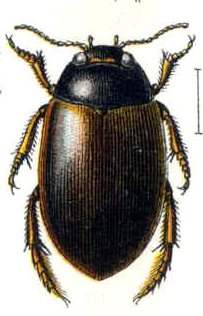
Agabus congener is a species of predatory beetle native to the Palearctic and the Near East. In Europe, it is only found in Andorra, Austria, Belarus, Belgium, Great Britain including Shetland, Orkney, Hebrides and Isle of Man, Bulgaria, Croatia, the Czech Republic, mainland Denmark, Estonia, Finland, mainland France, Germany, mainland Greece, the Republic of Ireland, mainland Italy, Kaliningrad, Latvia, Lithuania, Northern Ireland, North Macedonia, mainland Norway, Poland, Russia, Sardinia, Slovakia, mainland Spain, Sweden, Switzerland, the Netherlands and Ukraine.
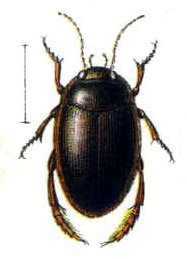
Agabus fuscipennis is a species of beetle native to the Palearctic and the Nearctic. In Europe, it is only found in Austria, Belarus, the Czech Republic, mainland Denmark, Estonia, Finland, Germany, mainland Italy, Kaliningrad, Latvia, Lithuania, mainland Norway, Poland, Russia, Sardinia, Sicily, Slovakia, Sweden, and Ukraine.

Agabus melanarius is a species of beetle endemic to Europe, where it is only found in Austria, Belgium, Bosnia and Herzegovina, Great Britain, Bulgaria, the Czech Republic, mainland Denmark, Estonia, Finland, mainland France, Germany, Hungary, mainland Italy, Kaliningrad, Lithuania, Luxembourg, mainland Norway, Poland, Russia except in the East, Sardinia, Slovakia, Sweden, Switzerland, the Netherlands, Ukraine and Yugoslavia.

Agabus striolatus is a species of beetle endemic to Europe, where it is only found in Austria, Belarus, Belgium, Great Britain including Shetland, Orkney, Hebrides and Isle of Man, Croatia, the Czech Republic, mainland Denmark, Estonia, Finland, mainland France, Germany, Hungary, mainland Italy, Latvia, Lithuania, Poland, Russia except in the East, Slovakia, Sweden, the Netherlands and Ukraine.

Agabus uliginosus is a species of beetle native to the Palearctic, including Europe, where it is only found in Austria, Belarus, Belgium, Great Britain including Shetland, Orkney, Hebrides and Isle of Man, Croatia, the Czech Republic, mainland Denmark, Estonia, Finland, mainland France, Germany, Hungary, Iceland, mainland Italy, Kaliningrad, Latvia, Lithuania, Luxembourg, mainland Norway, Poland, Romania, Russia, Slovakia, Slovenia, Sweden, Switzerland, the Netherlands, Ukraine and Yugoslavia.

Agabus undulatus is a species of beetle native to the Palearctic, including Europe, where it is only found in Albania, Austria, Belarus, Belgium, Bosnia and Herzegovina, Great Britain including Shetland, Orkney, Hebrides and Isle of Man, Bulgaria, Croatia, the Czech Republic, mainland Denmark, Estonia, mainland France, Germany, Hungary, mainland Italy, Kaliningrad, Latvia, Lithuania, Luxembourg, mainland Norway, Poland, Russia, Slovakia, Slovenia, Sweden, Switzerland, the Netherlands, and Ukraine.

Noterus crassicornis is a genus of beetle native to the Palearctic and the Near East. In Europe, it is only found in Austria, Belarus, Belgium, Bosnia and Herzegovina, Bulgaria, Croatia, Cyprus, the Czech Republic, mainland Denmark, Estonia, European Turkey, Finland, mainland France, Germany, Great Britain including the Isle of Man, Hungary, the Republic of Ireland, mainland Italy, Latvia, Lithuania, Luxembourg, Moldova, Northern Ireland, North Macedonia, mainland Norway, Poland, Russia, Sicily, Slovakia, Slovenia, Sweden, the Netherlands, Ukraine and Yugoslavia.


















